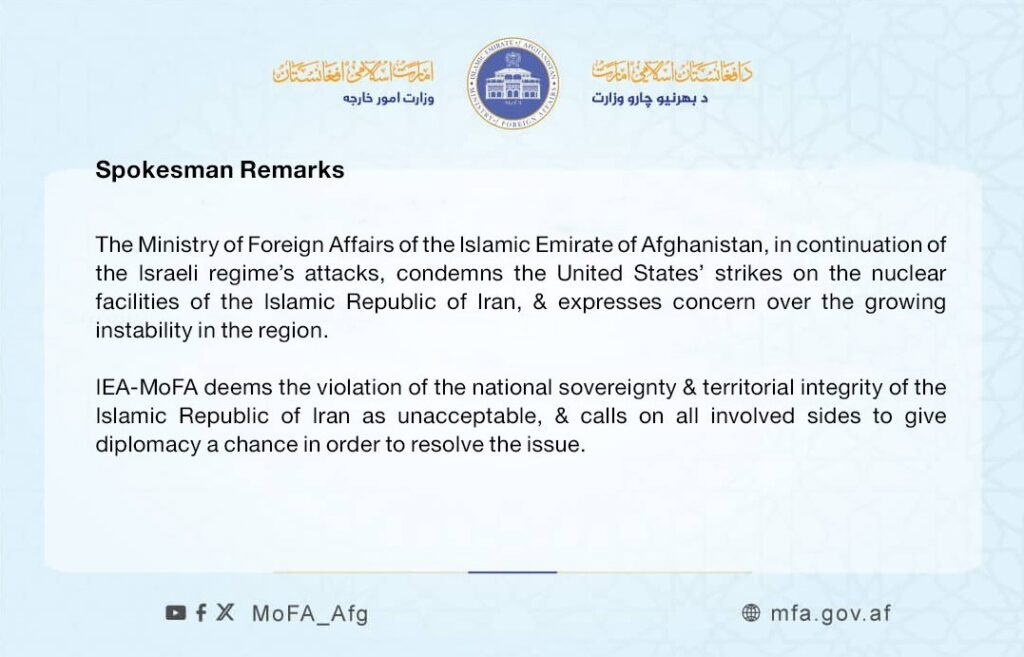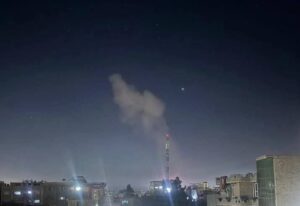Review of Afghanistan developments
In the wake of the Israeli and subsequently American attacks on Iran, the Taliban’s stance has been one of condemnation. However, within the realm of diplomacy, the nature and intensity of a government’s formal response can indicate nuanced insights. This article provides an analytical examination of the Taliban’s stance to the Israeli and American strikes on Iran, elucidating certain aspects by analyzing two statements released by the Afghan caretaker government concerning this matter.
When Israel initiated its initial assault on Iran, the Taliban’s stance was conveyed via the spokesperson for the “Islamic Emirate of Afghanistan.” Within the organizational framework of the Taliban government, there exists an office for the Emirate’s spokesperson, situated in Kandahar and led by Zabihullah Mujahid. This office outlined stance, represent the stance of the entire government. Mujahid, through the issuance of a press release, vehemently denounced the assaults by the Israeli regime on the land of the Islamic Republic of Iran, as well as the killings of Iranian commanders and nuclear scientists.
Taliban’s stance downgrade from government spokesman to Foreign Ministry
Following the US assault on the nuclear sites at Fordow, Natanz, and Isfahan, the Taliban’s stance was articulated as a mere “statement” from the Ministry of Foreign Affairs. In this declaration, the US strikes on the nuclear facilities of the Islamic Republic were denounced, and the infringement upon the national sovereignty and territorial integrity of the Islamic Republic was deemed intolerable. In contrast to the previous occasion, when the Taliban’s stance was conveyed by the government spokesperson, this time it was communicated by the Ministry of Foreign Affairs.

An analysis of the Taliban’s stance on global events indicates that the Ministry of Foreign Affairs of Afghanistan’s caretaker government typically utilizes “announcements” and infrequently releases “statements” concerning international matters. For instance, in relation to the Indo-Pakistani conflict following the Pahlakam incident, the Taliban’s stance was conveyed through an “announcement” from the Ministry of Foreign Affairs. Conversely, the Taliban’s stance on certain events, such as the Israeli assault on Iran during the Gaza War in 2024, the results of the US elections, the Zionist regime’s incursion into Syrian territory (subsequent to the establishment of Ahmad al-Sharaa’s government), and issues pertaining to Palestine, was articulated through a “statement” issued by the Ministry of Foreign Affairs.
The difference between ” announcement ” and “statement”
In the realm of diplomacy, a “statement” typically carries greater credibility and significance as it is formally issued on behalf of the government or nation, encapsulating the overarching stances of the government. A “statement” is generally meticulously crafted and released following essential coordination at a senior governmental level. Conversely, a “announcement,” which is often disseminated by a spokesperson from the Ministry of Foreign Affairs or a government representative, while still important and authoritative, tends to possess an explanatory, interpretative, or reactive nature concerning current events, lacking the same political weight as a statement.
An analysis of the Taliban’s stance
Upon reviewing the two announcements, it is clear that there are several insights regarding the Taliban’s stance on the Israeli and American attacks on Iran. Firstly, the Taliban government adopted a more elevated tone to denounce the Israeli aggression against Iran, articulated by Zabihullah, which outlined the government’s comprehensive stance. In contrast, the condemnation of the American strike on Iran’s nuclear sites was downgraded to a mere “announcement” issued by the Ministry of Foreign Affairs.
Given that the United States had recently engaged in an open conflict with Iran, launched attacks on a nation’s nuclear installations, and clearly breached the UN Charter as well as the guidelines set forth by the International Atomic Energy Agency, coupled with its undeniable hostility towards the Islamic world, it was fitting for the Taliban’s stance to be articulated through a “statement.” However, it was merely downgraded to a “announcement ” issued by the spokesperson of the Foreign Ministry.
Considering that the Taliban regime is an Islamist government, it was anticipated that its reaction to the US assault on Iran would be more robust; however, it was confined to a brief “announcement”. This assault has faced condemnation from numerous Western and international nations and organizations due to its breach of various commitments and ethical standards. An attack on a nation’s nuclear facilities could lead to a significant humanitarian catastrophe, which is why the international response to the US attack was extensive. For these reasons, a more resolute and forceful stance from the Taliban government was anticipated.
Related Articles:
Iran-Israel War: The stance of Taliban and political factions
Zionist regime’s Aggression against Iran: Behaviors and Needs
Neither of the two stances held by the Taliban government acknowledges Iran’s right to self-defense. According to international law, a nation that is assaulted by allied and neighboring countries is deemed to have the right to a legitimate response. Consequently, several of Iran’s neighboring countries have cited their right to self-defense in their official statements.
Overall, while the Taliban government condemned both Israeli and American aggression towards Iran, there is no question regarding this Taliban’s stance. Given that Iran is a friendly, Islamic, and neighboring country, it was anticipated that the Taliban’s response to American aggression on Iranian territory would be more pronounced, both in terms of stance and decisiveness.
The unofficial statements made by numerous Taliban members since the onset of the Israeli regime’s aggression against Iran, which have surfaced on social media, serve as evidence of their profound animosity towards both the Israeli regime and the United States, while simultaneously demonstrating their support for Iran. Their expressions and phrases distinctly convey this sincere stance. It would be better if these stances were also represented at the official level.
Follow us on social medias:

















